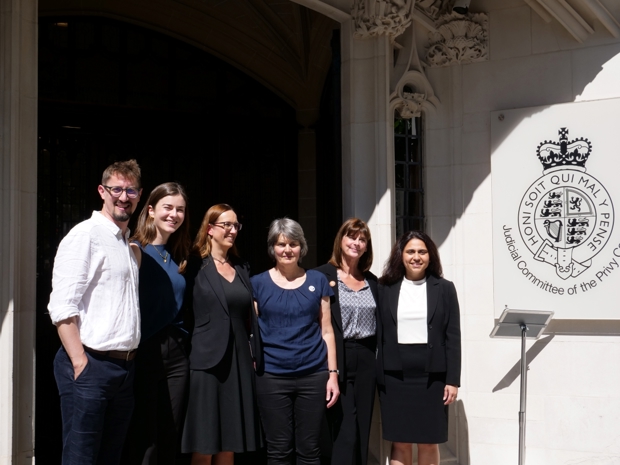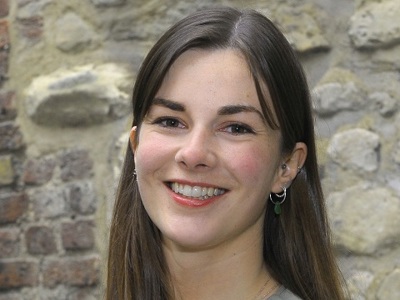
Historic Supreme Court judgment rules planning permission for oil production at Horse Hill, Surrey is unlawful and must be overturned
In a ground-breaking judgment the Supreme Court has today, Thursday 20 June 2024, ruled that planning permission for fossil fuel production should not be granted unless and until a planning authority has properly assessed the climate impact of the project and specifically assessed the downstream greenhouse gas (GHG) emissions that will inevitably arise from the combustion of the fuel.
Posted on 20 June 2024
In so doing, the Supreme Court declared that Surrey County Council’s decision to grant planning permission for oil production at Horse Hill, near to Gatwick Airport, was unlawful, bringing to a successful conclusion a five-year battle fought by campaigner Sarah Finch (supported by the Weald Action Group) against the development.
In their judgment, Lord Leggatt, Lord Kitchin and Lady Rose ruled that the council should have taken into consideration the “Scope 3” downstream GHG emissions of the crude oil to be extracted from the Horse Hill site in its environmental impact assessment (EIA) before deciding whether to grant planning permission for the development.
They held that it was unlawful to grant planning permission, without assessing the unavoidable indirect effects on climate of the inevitable burning of the extracted petroleum.
The case centred around the correct interpretation of the EIA Regulations 2017. The Supreme Court found that downstream GHG emissions are an indirect effect of the development and must – as a matter of law – be assessed before granting planning permission for fossil fuel development.
Key to the Court’s finding was that, for the EIA regime to function effectively, and for approval for projects with likely significant environmental effects to be given lawfully, those decisions must be subject to public debate and made with full knowledge of the environmental cost. Otherwise, such decisions – so the Supreme Court found – would lack the necessary democratic legitimacy.
The Court concluded that the reasons given by the council for refusing to carry out this assessment were inadequate. The Court held that it was wrong to limit the requirements of EIA by reference to UK policy and legislation designed to control GHG emissions, making the common sense point that combustion emissions were unavoidable and there were no other controls that could be relied upon to reduce their impact. For similar reasons, the Court also dismissed an argument that the fact the oil would need to be refined somehow excused a failure to assess its impact at the earliest possible stage.
It follows that planning authorities in England and Wales must now assess the climate impact of any proposed fossil fuel developments that come under the EIA regime, and that the assessment must include consideration of the nature and magnitude of the proposed GHG emissions that would be caused by combustion of the oil to be produced at the site.
Sarah’s claim was supported by both Friends of the Earth and Greenpeace UK. Both organisations had intervened in the case and are expected to hail the decision as a huge victory in their ongoing campaigns to prevent fossil fuel extraction. The Office for Environmental Protection also intervened, using its powers to do so for the first time since its creation in November 2021.

Sarah was represented by Leigh Day lawyers Rowan Smith, Carol Day and Julia Eriksen, who instructed Marc Willers KC (Garden Court Chambers) and Estelle Dehon KC and Ruchi Parekh (Cornerstone Barristers) to act on her behalf. Sarah’s Supreme Court appeal was funded with support from Law for Change.
The proposed expansion of the Horse Hill Developments Ltd site, with five drilling cellars, four hydrocarbon production wells, four gas-to-power generators, a process, storage and tanker loading area, seven 1,300-barrel oil tanks, and a 37-metre drill rig would have allowed large-scale production of up to 3.3 million tonnes of crude oil for sale and use as transport fuel for 20 years.
Sarah brought a High Court claim for judicial review on behalf of the Weald Action Group in 2019, arguing that the emissions from burning the oil are “indirect effects” under the EIA Regulations and should have been assessed by Surrey County Council planners before granting planning permission.
Her claim was originally rejected by Mr Justice Holgate. Sarah appealed that decision. Her appeal was also dismissed, albeit by a majority of 2 to 1 judges, who concluded that downstream GHG emissions may be an indirect effect of a development for the production of fossil fuel, but that it was ultimately a matter of planning judgment for the planning authority whether those emissions are truly a likely significant effect of the proposed development. The two judges also concluded that the reasons given by Surrey County Council for deciding that the downstream GHG emissions were not an effect of the development were sufficient and lawful.

In the Supreme Court, Sarah argued that the Court of Appeal’s decision was wrong on both counts. Three of the five Supreme Court Justices agreed and allowed her appeal, whilst the other two Justices dissented.
The Supreme Court’s decision is historic and of major importance in the fight to prevent further fossil fuel extraction in the UK.
Sarah Finch said:
“I am absolutely over the moon to have won this important case. The Weald Action Group always believed it was wrong to allow oil production without assessing its full climate impacts, and the Supreme Court has shown we were right.
“This is a welcome step towards a safer, fairer future. The oil and gas companies may act like business-as-usual is still an option, but it will be very hard for planning authorities to permit new fossil fuel developments – in the Weald, the North Sea or anywhere else – when their true climate impact is clear for all to see.
“I thank the Weald Action Group, Friends of the Earth and everyone who has been part of our long journey through the courts. And I thank my lawyers for their commitment and hard work.”
Sarah Finch is represented by solicitors Rowan Smith, Carol Day and Julia Eriksen at law firm Leigh Day.
Rowan Smith said:
“Our client is delighted the Supreme Court has held Surrey County Council’s decision unlawful. The Court recognised that, because there was no doubt the oil would be burnt and release damaging [GHG] emissions into the air, such climate impact was an indirect effect of the project and should have been assessed as part of it. Key to the Court’s conclusions was that such decisions must only be authorised after proper public involvement and in the full knowledge of the environmental cost. Crucially, the Court recognised that climate change is a global problem and that the damaging impact of emissions on the climate is not limited to where they originate. This truly historic judgment has very significant implications for the future assessment of fossil fuel projects and a number of cases currently before the Courts.”
Click here for a link to an explanation of the judgment.




